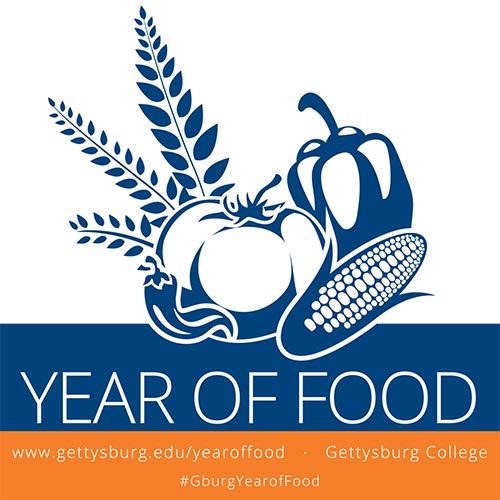Year of Food spurs food issue awareness on campus
By Benjamin Pontz, Contributing Writer
Few topics conjure such passionate reactions from students as food. Over the next nine months, Gettysburg College students will have a chance to explore, study and interact with that subject through the “Year of Food,” the first program of the new “Gettysburg Cycle” coordinated by the Center for the Study of Global Issues (CSGI). Planning began last spring when Dr. Caroline Hartzell, professor of Political Science, proposed it to the faculty. “For a number of years, I’ve been teaching about food and conflict,” said Hartzell. “Students seemed really, really interested in food issues, and we talked about the fact that there are other classes at this college that have food issues. And so I asked students whether it would be cool to have a college-wide focus on food, and they said yes.”
When considering the practicality of a different college-wide theme each year, Hartzell realized it would be impractical for faculty to develop new courses every year that would be taught only once. Thus the concept of a four-year rotation, allowing every Gettysburg student to experience each theme once, was borne. The Gettysburg Cycle also includes focuses on health, conflict, conflict resolution and water. Each theme has applications at the local, national and international levels and can be approached in the natural sciences, the social sciences and the humanities.
Faculty have worked arduously to develop courses that resonate with the theme; Hartzell reports that at least 60 faculty members are participating in some way. One of those faculty members is Dr. David Walsh, assistant professor of religious studies. Walsh developed a new first-year seminar entitled “Diets and Deities: Eating Our Way Through Religious Traditions.” He had wanted to do a course on food for some time, and the Year of Food was an ideal impetus forward. “When I heard that some people were thinking about making a theme-year on food I immediately jumped in,” he said. “I decided to make the course a first-year seminar so I could involve my students in so many activities outside of the classroom that people were offering. For instance, we will be reading about ethical agriculture practices, going to a related academic talk the college is hosting and participating in a harvest at the Painted Turtle Farm. What a great way to show students that what we are learning in the classroom can be taken into the world.”
Hartzell identified three goals from the Gettysburg curriculum that this theme year can encapsulate: integrative thinking, multiple inquiries and informed citizenship. These connections are among the most exciting aspects of the theme year to faculty members like Walsh. “Right away I was also drawn to the idea of a theme-year because it was so collaborative. People from all over the campus were coming up with great ideas of how to engage the theme,” he said.
Dr. Salma Monani, associate professor of Environmental Studies, first developed a food-related course eight years ago called “Green Eggs and Government Cheese: Food for Environmental Sustainability” and is teaching it again this year with reinvigorated cross-campus connections. To Monani, food is one of the most important areas to study academically. “We always open the first week of class with the question: ‘Why study food?’ As my students immediately note, food is essential to life. But, as they also note, there is more to it,” she said. Questions like, “why have food anxiety disorders often been classified as ‘women’s problems’?” or “why are the environmental impacts of what we eat often ignored?” not only lead to rich discussions but also compel students to take action.
Hartzell was quick to point out that this theme transcends the academic component of the college. She has spent considerable time working with the college life department to bring activities pertaining to food to the forefront of campus. Not surprisingly, Dining Services is enthusiastically participating and college houses, clubs and other student organizations are also going to be engaging with the issue. The first major event is on Friday, Sept. 23 when the Dining Center will close, Lincoln Avenue will shut down and the campus will be transformed into a street festival celebrating food with vendors from the Gettysburg area. Working alongside the community is another pivotal component to the Year of Food; from campus food projects such as the Painted Turtle Farm and Campus Kitchen to off-campus projects such as the SNAP Challenge and the SCCAP Gleaning Project, there is an abundance of opportunities to get involved whether or not students are in courses that are participating directly. For those courses that are participating directly, the Year of Food will hold an Undergraduate Research on the Cycle (UROC) celebration in April where students can present food-related projects on which they have worked during the course of the academic year. All disciplines will be represented; cross-curricular connections are central to the Year of Food.
With the Year of Food already underway, Hartzell looks forward not only to what it brings but also what the Gettysburg Cycle will become down the road. “As it becomes more institutionalized, we can do even more,” she said. “It’s exciting.”

